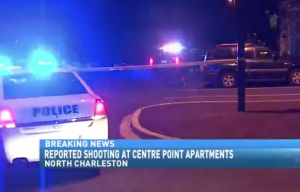
Shooting Injures 1 at North Charleston Apartment Complex. (ABCnews4.com)
Could this shooting have been prevented and are justice and compensation available to the victim?
Local News
Security measures are under scrutiny following a shooting at a North Charleston, South Carolina apartment complex Wednesday night, February 6, 2019.
According to Live5News.com, “[t]he shooting happened at a parking lot at the Centre Pointe apartments on the 4900 block of Wetland Crossing” and “[a]round 10:23 p.m., officers responded to the complex…and made contact with the victim, a 27-year-old man, and a 26-year-old woman.” ABCNews4.com is reporting “a man and woman were in the parking lot at Centre Pointe Apartments in a car when an unknown suspect pulled up behind them with a silver truck and then opened fire, striking the victim and the vehicle.”
The victim was transported to the hospital where “Medical staff later reported locating five bullet entry points in the victim’s right buttock and thigh area, as well as a single graze wound to the victim’s right finger,” Live5News.com reports. The report further states “officers located a car which had been struck by gunfire numerous times, and seventeen 9 mm shell casings near the vehicle.”
The investigation is ongoing.
Our Legal Take
Apartment residents and guests have a right to feel safe and secure while on the premises. The Murray Law Firm questions the level of security provided on the property and whether this tragedy may have been prevented.
- Have there been prior incidents of violence on or near property?
- What security measures, such as gated-entry, fencing, visible surveillance cameras, and security patrols, were in place to deter crime and protect the victims at the time of the shooting?
Generally, property owners are required to protect all those legally on the premises from any foreseeable harm. Should the facts of this matter reveal that the apartment complex owner or management failed to provide adequate security to protect those on its premises, the victim may seek justice and elect to pursue legal claims for his injuries.
Based upon its prior successful experience in handling security negligence claims on behalf of victims and their families, The Murray Law Firm suggests that photographs and a thorough, unbiased inspection of the property will need to be performed immediately, before any evidence may be repaired, damaged or destroyed. Given the complexities of pursuing a negligent security case, it is imperative that the victim retain an experienced attorney who can ensure the preservation of any and all evidence that may support such a claim.
We’ve Recovered Millions for Victims of Apartment Security Negligence…Contact us Now for a Free Consultation.
The Murray Law Firm has an extensive and successful record representing victims of violence and security negligence. We have recovered millions of dollars for our Clients, and recently obtained a $29.25 million dollar verdict for a victim of an unsafe property. We offer our legal assistance, if desired.
We represent our Clients on a contingency agreement, which generally means that no fees or payments are owed until and unless we recover. Anyone seeking further information or legal representation is encouraged to contact us via e-mail (click here) or by telephone at 888.842.1616. Consultations are free and confidential.
Click Here to Find Out How to Choose the Right Attorney
DISCLAIMERS: The information contained in this post is from secondary sources and may therefore contain inaccuracies. We will gladly correct or remove this post upon request. The material contained in this post is not intended to constitute legal advice. As each Client is unique, please contact us for a free consultation on your particular case. “Contingent attorneys’ fees” refers only to those fees charged by attorneys for their legal services. Such fees are not permitted in all types of cases. Court costs and other additional expenses of legal action usually must be paid by the client.
 The Legal Herald
The Legal Herald


